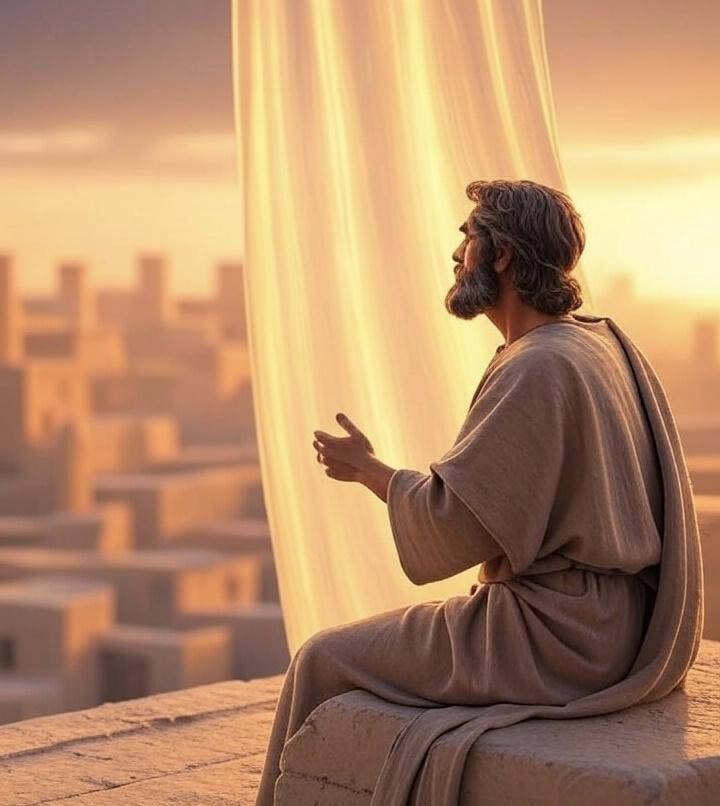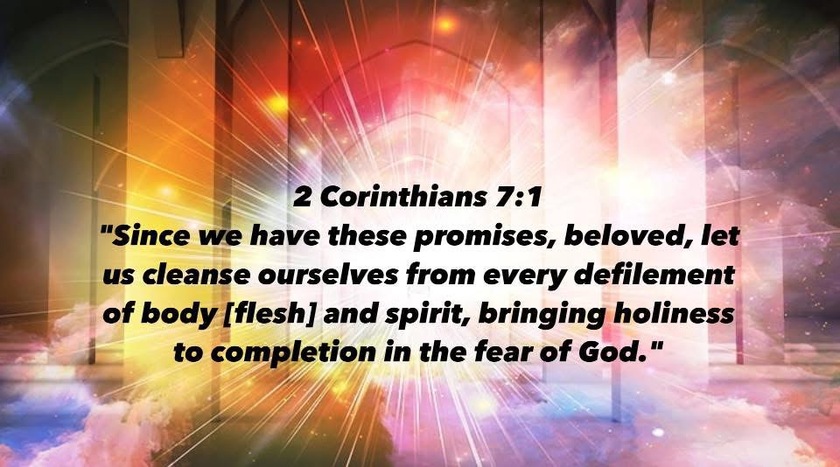Unfolding the Sheet: Peter’s Journey from Resistance to Radical Inclusion
Acts 10:9
"The next day, as they were on their journey and approaching the city, Peter went up on the housetop about the sixth hour to pray. And he became hungry and wanted something to eat, but while they were preparing it, he fell into a trance."
God is working on Peter's heart. And His Spirit speaks to Peter's heart and mind as Peter falls into a trance. In this dream-like state Peter "saw the heavens opened and something like a great sheet descending, being let down by its four corners upon the earth." Now for me, being a person from the 20th century, I immediately imagine a film theater screen, or maybe a large screen TV. And while it's fun and interesting to consider these things, this isn't really the point. What's really important and interesting to consider is Peter is about to have his mind unsettled, and his cultural biases challenged.
Peter sees in the midst of this movie screen all sorts of animals that God created and which He calls "good" for food. Peter, being a good Jew has only ever eaten meat from animals that chew the cud or have cloven hooves. And again, while that's interesting, what I really see here is something else. What happens is, we have a command from God, something we should honor and give glory to...
Acts 10:13
And there came a voice to him: "Rise, Peter; kill and eat."
God is blessing these creatures and giving them for food, contrary to the traditions of Peter and his people. So, what's interesting to note is Peter's response.
Acts 10:14
But Peter said, "By no means, Lord; for I have never eaten anything that is common or unclean."
Now, let me ask you a question. If the Lord came to you in a dream or how ever he comes, and He commanded you to do something, would you say no as Peter did?
Imagine the will and mindset that Peter had. We've seen this sort of thing from him before. When the Lord told him he would deny him. And again, when he told Jesus that he believes him to be the Messiah but then refused to believe what Jesus said about his coming trial and execution, (Mark 14:66-72). We see this stubborn and proud man who easily believes and yet, at the same time easily refuses to accept what he is told to do with that belief. This is a common feature among many believers. They'll gladly believer but resist attending to the Lord's will in regard to the consequences of that belief.
The lord replies to Peter's stubborn disobedience:
Acts 10:15
And the voice came to him again a second time, "What God has made clean, do not call common."
Three times this command is repeated. Why? Why three times? It brings to my mind when the Lord asked Peter three times whether he loved him, and by virtue of that love for him, was he willing to feed the others that the Lord loves. Maybe this is why the command was repeated three times, to remind Peter about the command to feed the Lord's sheep. Not just to feed Peter, but to translate that message onto all those who the Lord is calling to himself, (John 21:15-17).
In the meantime, Peter is pondering these things and trying to work it all out in his mind. And while he's still inwardly perplexed...
Acts 10:17-18
"...behold, the men who were sent by Cornelius, having made inquiry for Simon's house, stood at the gate and called out to ask whether Simon who was called Peter was lodging there."
So God is leading Peter to an understanding. God set him up. And he did it in this manner because he understands Peter's heart and mind. He knows that Peter is a devote Jew and will resist any temptation to stray from that culture of purity, and he knows Peter's pride is also a problem. He knows Peter won't give in easily, unless he can see that it's absolutely a divine intervention into his cultural norms.
Acts 10:19-20
And while Peter was pondering the vision, the Spirit said to him, "Behold, three men are looking for you. Rise and go down and accompany them without hesitation, for I have sent them."
Without a direct command from the Lord, Peter is always going to default to his traditions, but what I want us to see is how immediately and resoundingly committed to the Lord’s will Peter now becomes. Peter immediately rises from his trance and from his pondering and goes to these gentile men and invites them in as guests. And they tell Peter what the Holy Angel told Cornelius.
Now remember he's in the Tanner's home, it's ritually unclean. These gentile men are ritually unclean. And the next day they are going to go to another ritually unclean place. Peter has had a profound heart transplant in regard to these things. And we'll see how he put two and two together during his earlier ponderings on the rooftop.
Acts 10:23-27
"The next day he rose and went away with them, and some of the brothers from Joppa accompanied him. And on the following day they entered Caesarea. Cornelius was expecting them and had called together his relatives and close friends. When Peter entered, Cornelius met him and fell down at his feet and worshiped him. But Peter lifted him up, saying, "Stand up; I too am a man." And as he talked with him, he went in and found many persons gathered."
What I want you to notice is the absolute lack of reservation on the part of Peter. No more, "By no means, Lord", and his typical stubborn insistence that he cannot or will not do these things the Lord has commanded. Now, without hesitation he goes to Caesarea and right on in too Cornelius' unclean home. And he's immediately meeting all sorts of unclean people there. And we learn what Peter learned on the rooftop.
Acts 10:28-29
And he said to them, "You yourselves know how unlawful it is for a Jew to associate with or to visit anyone of another nation, but God has shown me that I should not call any person common or unclean. So when I was sent for, I came without objection. I ask then why you sent for me."
Today's scripture focus is a powerful reminder of how God meets us where we are, challenging our biases and pride to align us with His broader purposes. Peter’s initial "no" is deeply human; it’s that mix of devotion and doubt, pride and piety. It's about the bondage of the will. We see it throughout Scripture (think Moses arguing with God at the burning bush or Jonah fleeing to Tarshish). It underscores that even the most faithful people can resist when God’s will disrupt their comfort zones.
From the rooftop trance to welcoming the messengers without hesitation, it’s a rapid shift in Peter's thinking. God is literally a movie director; His Spirit directed a personal revelation to unsettle Peter’s worldview. And the core message wasn't to detail kosher laws (though they’re fascinating historically; Leviticus 11 outlines them as part of Israel’s holiness code) but the plot of this movie is the command to honor God’s redefinition of clean and unclean. It’s a call to radical inclusion, challenging all of us today: Are we holding onto our cultural traditions that maybe hinder our understanding about God and our neighbors?
The rooftop trance is like a perfectly timed plot twist, unraveling Peter’s deeply ingrained cultural assumptions. It’s about God rewriting the script on what’s "clean" and "unclean," pushing Peter toward radical inclusion. Today, those traditions might not be dietary laws but could be our Church biases; corporate, social, racial, doctrinal, or even ideological, ideas that subtly shape who we see as "in" or "out." Peter’s rooftop story pushes us to listen for the Spirit’s voice, act without hesitation, and trust God’s redefinition of who belongs in His story.
Prayer:
Heavenly Father, open our hearts as You did Peter’s, challenging our biases and traditions that hinder Your inclusive love. Help us to rise without hesitation when You call us to embrace all people as clean in Your sight. May we feed Your sheep with humility and obedience, reflecting Your grace to the world.
In Jesus’ Holy name, Amen.




















